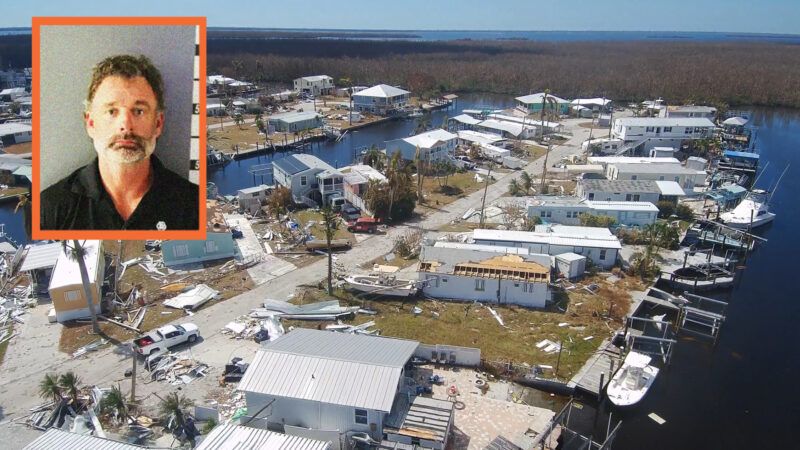Texas Roofer Arrested in Florida for Helping Hurricane Victims
He's fully licensed, but not in the right state.

After Hurricane Ian pulverized parts of Florida earlier this month, roofer Terence Duque sprung into action.
Duque has run a successful Texas-based commercial and residential roofing business since 2008. He's got an A-plus rating from the Better Business Bureau and has been named a "preferred contractor" by national roofing supply company Owens Corning. And in the wake of Ian, there's an obvious need for roofers and other contractors in Florida, as cleaning up and repairing the storm's damage will take months, if not years. Duque thought he could help by offering his services to homeowners with damaged roofs in Charlotte County, near where the brunt of the storm hit.
The county's response: "Get him."
Duque was arrested for "conducting business in Charlotte County without a Florida license," the Charlotte County Sheriff's Office announced on Friday. If charged as a felony, that's an offense that could carry up to five years in prison under Florida law—although it's possible that Duque could be charged with only a misdemeanor offense that carries a mere one year of jail time.
Either way, it's an obviously outrageous response.
According to the Charlotte County Sheriff's Office, Duque got busted for his good deed after the Charlotte County Economic Crimes Unit—which is apparently a real thing—received a call from an investigator with the state Department of Business and Professional Regulation (DBPR).
When a detective with the sheriff's office tracked down Duque, the roofer reportedly said he believed he was allowed to work in Florida due to Gov. Ron DeSantis' emergency order that loosened licensing rules in the aftermath of the storm. "The investigator informed Terence that this was not the case, and that Terence would be placed under arrest, as he had already done work in violation of the statute," according to the Charlotte County Sheriff's Office.
No good deed goes unpunished, it seems.
"DBPR does not appear to realize that it is the bad guy here," says Justin Pearson, managing attorney for the Florida office of the Institute for Justice, a libertarian law firm. "When safe, successful businesses come to Florida in the aftermath of a hurricane to provide much-needed assistance, the last thing DBPR should want is for the workers to be arrested and charged with a felony. DBPR is punishing people for doing the right thing."
Pearson notes that 18 states have universal licensing recognition laws—meaning that a license issued in another state is accepted as valid—but Florida is not one of them.
That's convenient protectionism for roofers and other contractors in Florida, but it's terrible news for anyone who needs a new roof right now.
As FloridaPolitics.com noted, Florida's contracting licensing requirements are notoriously strict and costly. It takes four years to get licensed for a variety of residential and commercial construction work in Florida, according to data collected by the Institute for Justice.
Defenders of those licensing schemes argue they are meant to protect consumers from unscrupulous contractors and scammers, but this situation illustrates how consumers are hurt by those same rules. Allowing licensed roofers from other states to work in Florida would help make post-hurricane repairs move more quickly, and would give consumers more choices (and possibly lower prices) even in nonemergency situations.
"These people have been through enough, and I will not allow unlicensed contractors to further victimize them," Charlotte County Sheriff Bill Prummell said in a statement.
Heckuva job, Bill.


Show Comments (91)